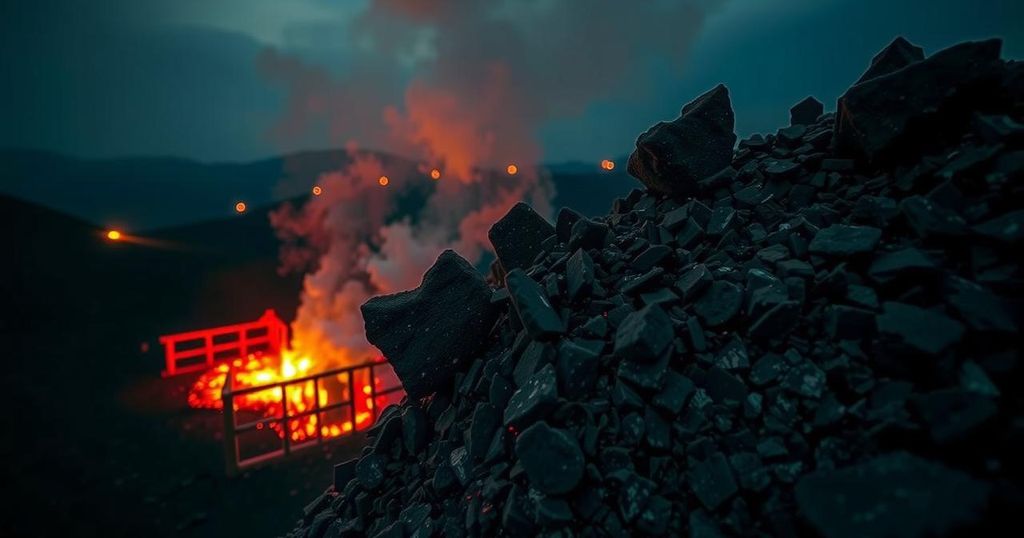Politics
ACCRA, AFP, AFRICA, ASH, ASHANTI, CIVIC ENGAGEMENT, CORRUPTION, DEMOCRACY, GHANA, GHANA WATER COMPANY LIMITED, JOHN MAHAMA, LEADERSHIP, LEADERSHIP QUALITIES, MAHAMU, MAHAMUDU BAWUMIA, NANA AKUFO - ADDO, NATIONAL DEMOCRATIC CONGRESS, NDC, NEW PATRIOTIC PARTY, NPP, OSINO, SOCIAL ISSUES, WESTERN
Leila Ramsay
0 Comments
Ghana’s Illegal Mining Crisis: A Central Issue in the Presidential Election
Ahead of Ghana’s presidential election, illegal mining, or “galamsey,” has become a central issue. Driven by unemployment and poverty, miners face dire consequences for the environment and their livelihoods. With rising public discontent over ineffective government responses, candidates are pressured to address the ongoing crisis, making it a pivotal theme in the elections.
In Ghana, illegal mining, locally termed “galamsey,” has surged, intensifying discussions ahead of the upcoming presidential election. Miners like Frank are compelled to pursue this perilous profession due to widespread poverty and unemployment. With Ghana positioned as a significant gold exporter, the illegal practices exacerbate environmental degradation, severely impacting agriculture, notably the cocoa industry, and jeopardizing water quality across the nation. Amidst this turmoil, both candidates in the election face public outcry, as citizens advocate for responsible mining practices and express disillusionment with government efforts.
As the country prepares for the polls to select the successor to President Nana Akufo-Addo, the illegal mining issue raises concerns regarding ecological sustainability and economic stability. In recent years, illegal mining has proliferated, largely driven by soaring gold prices and high youth unemployment. The consequences are evident, with devastation of arable land and contamination of rivers, which threatens drinking water for millions. Miners report earning a substantial income compared to formal employment, urging the government to create viable jobs instead of deploying military forces to dismantle their operations.
The message among miners and environmental advocates alike is clear: the government must engage in serious dialogue and formulate concrete strategies to address the challenges posed by illegal mining. Promises made by the ruling party in 2017 to eliminate galamsey appear unfulfilled, as the need for robust stakeholder collaboration remains unmet. The illegal mining sector currently accounts for approximately 40 percent of Ghana’s total gold production, employing more than one million individuals, exacerbating both social and environmental crises.
As voters head to the polls, the issue of galamsey encapsulates broader disillusionment with governance and the perception that politicians prioritize immediate economic benefits over sustainable development. For the populace, notably the youth, the election serves as a critical juncture to demand solutions that protect their livelihoods and the environment.
The issue of illegal mining in Ghana, known as “galamsey,” has reached critical levels, deeply affecting social, economic, and environmental facets of the country. With Ghana as one of the leading producers of gold and cocoa, the rise in illegal mining has led to significant land degradation, water pollution, and threatens the livelihoods of many in farming communities. As the nation approaches a pivotal presidential election, the exponential growth of this underground industry has become a focal point for voters and candidates alike, raising questions about the effectiveness of governmental responses and the need for sustainable solutions.
In summary, the ongoing crisis of illegal mining in Ghana highlights the urgent need for meaningful political action as the country approaches its presidential election. Both candidates face mounting pressure from the electorate to address the environmental and economic impacts of galamsey. The call for responsible mining practices underscores a collective demand for sustainable livelihoods and effective governance, emphasizing that electoral decisions may hinge significantly on how candidates propose to tackle this escalating issue.
Original Source: www.barrons.com




Post Comment